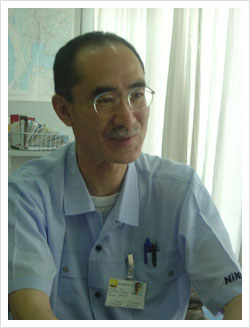|
|
|
|
|
> > An Interview with the President of Nikon (Thailand) Ltd.
|
| |
| An Interview with the President of Nikon (Thailand) Ltd. |
| |

|
“The development of Thailand today greatly depends on the industrial sector. More and more international corporations are coming to invest in Thailand, especially Japanese corporations. If Thailand can provide equal education to all citizens, Thai people will have better job opportunities, and that definitely will benefit the country’s economy.”
|
| |
|
|
|
|
|
An Interview with the President of Nikon (Thailand) Ltd. |
|
|
Mr. Kanasawa Keniji
Mr. Keniji Kanasawa, the president of Nikon (Thailand) Ltd., believes that education is the key to Thailand’s progress and solution to poverty. Unfortunately, education in Thailand, especially in the higher levels, is still limited only to the rich, who are the minority of the country.
Mr. Kanasawa became the president of Nikon (Thailand) Ltd. five years ago, when Thailand’s economy decline. He said Bangkok at that time did not look as beautiful and modern as it is today. There were many unfinished buildings, unlike today’s Bangkok where streets are full of latest automobiles.
Nowadays, Thailand is making bigger economic progress than any country in the region. But the concern is about the quality of its human resources. The direction of Thailand education is still unclear, and educational opportunities have been unequal. These are the main obstacles to Thailand’s progress. |
|
 |
Mr. Kanasawa also said that it is virtually impossible for Thailand to completely get rid of poverty. Even in Japan, there are still people who are poor or poorly paid. However, Japanese citizens receive equal opportunity in education. Anyone who wants to study higher education usually gets his or her wish. But in Thailand, only the rich can attend higher education institutes. The poor are thus lagging behind in knowledge and qualifications to find well-paid jobs,
When asked about the help from the business sector, Mr. Kanasawa said it was very important to the country’s progress. He explained that waiting for government’s help can take a long time or be unnecessarily complicated. Some problems might seem too trivial for the government, but many organizations could join in to solve them or increase the awareness of those problems. ่
As for Nikon’s policy for social causes, the headquarters in Japan is the one in charge. The corporation has created a department only for charitable activities. Besides helping physically and mentally disable children, which the company has been doing for a long time, Nikon also holds an annual fundraising international competition of pictures taken by Nikon cameras, where profits are donated to various social causes. Although Nikon (Thailand) does not have a department like this, the company has conducted charitable activities on many occasions, such as an internal fundraising for tsunami victims, and of course, donations to EDF education funds. Both Japanese and Thai managers often get together and discuss how the company can create positive impact for the society.
Finally, Mr. Kanasawa told us that he really wanted to visit his sponsored student in the northeast if he could arrange his busy schedule. Now that the schools are open, he asked all EDF scholarship students to be good students, and help their own family as much as they could. The road ahead might be difficult, but he wanted everyone to be strong for their families’ and their future. |
|
|
 |
|
| 2010-06-06 | Donor's Voices | เปิดอ่าน 8467 |
|
|
|
|
|
|
|
|

